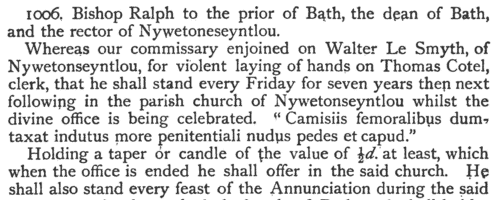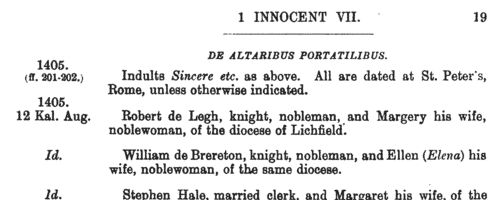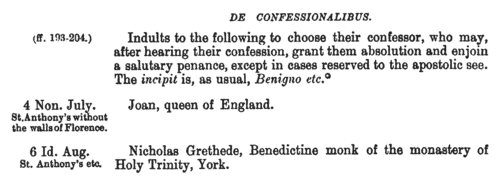Couton Surname Ancestry ResultsOur indexes 1000-1999 include entries for the spelling 'couton'. In the period you have requested, we have the following 13 records (displaying 1 to 10): Buy all | | | Get all 13 records to view, to save and print for £48.00 |
These sample scans are from the original record. You will get scans of the full pages or articles where the surname you searched for has been found. Your web browser may prevent the sample windows from opening; in this case please change your browser settings to allow pop-up windows from this site. Grantees of offices, commissions and pardons
(1317-1321)
The Patent Rolls are the Chancery enrolments of royal letters patent. Those for the 11th to the 14th years of the reign of king Edward II (8 July 1317 to 7 July 1321) were edited for the Public Record Office by G. F. Handcock, and published in 1903. The main contents are royal commissions and grants; ratifications of ecclesiastical estates; writs of aid to royal servants and purveyors; and pardons. Most extensive are the commissions of oyer and terminer to justices to investigate complaints about specific crimes and wrongs in particular counties.COUTON. Cost: £2.00.  | Sample scan, click to enlarge

| Clergy, the religious and the faithful in Britain and Ireland
(1305-1342)
These are abstracts of the entries relating to Great Britain and Ireland from the Regesta of popes Clement V, John XXII and Benedict XII. Many of these entries relate to clerical appointments and disputes, but there are also indults to devout laymen and women for portable altars, remission of sins, &c. This source is particularly valuable for Ireland, for which many of the key government records of this period are lost. Clement V was consecrated and crowned 14 November 1305 (the day from which his pontificate is dated); John XXII was crowned 5 September 1316; Benedict XII 8 January 1335 and died 25 April 1342. From 1309 onwards the papacy was in exile at Avignon. The extracts were made by W. H. Bliss from Regesta lii to cxxxvi, and published in 1895. Bliss remarked that 'although the writing of the Papal Registers of the 14th century is clearer than that of many contemporary English MSS., the entries in them were for the most part founded upon petitions or letters from different countries, and the scribes in the Papal Chancery must have experienced even greater difficulty in copying English proper names than English students experience nowadays in reading the early Chancery Rolls preserved in the Public Record Office. Not having local or personal knowledge, they constantly misread doubtful letters.'COUTON. Cost: £4.00.  | Sample scan, click to enlarge

| Grantees of offices, commissions and pardons
(1350-1354)
The Patent Rolls are the Chancery enrolments of royal letters patent. Those for the 24th to the 27th years of the reign of king Edward III (25 January 1350 to 24 January 1354) were edited for the Public Record Office by R. F. Isaacson, and published in 1907. The main contents are royal commissions and grants; ratifications of ecclesiastical estates; writs of aid to royal servants and purveyors; and pardons. COUTON. Cost: £2.00.  | Sample scan, click to enlarge

| Clergy, the religious and the faithful in Britain and Ireland
(1342-1362)
These are abstracts of the entries relating to Great Britain and Ireland from the Regesta of popes Clement VI and Innocent VI, from the period when the papal court was resident at Avignon. Many of these entries relate to clerical appointments and disputes, but there are also indults to devout laymen and women for portable altars, remission of sins, &c. This source is particularly valuable for Ireland, for which many of the key government records of this period are lost. Clement VI was consecrated and crowned 19 May 1342 (the day from which his pontificate is dated); Innocent VI was crowned 18 December 1352 and died 12 September 1362. The extracts were made by W. H. Bliss and C. Johnson from Regesta cxxxvii to ccxliv, and published in 1897. The registers are almost complete for these two pontificates. At his accession, Clement VI promised to grant benefices to all poor clerks who should come to Avignon and claim them within two months of his coronation. As many as 100,000 are said to have come, and the register for the first year of his pontificate runs to twelve volumes.COUTON. Cost: £4.00.  | Sample scan, click to enlarge

| Clerks and Clergy in Somerset
(1329-1363)
The register of bishop Ralph de Salopia or Shrewsbury of Bath and Wells, containing general diocesan business, mostly relating to clergy, but with some parochial affairs and disputes with names of parishioners. The diocese of Bath and Wells at this period was almost exactly coextensive with the county of Somerset. COUTON. Cost: £4.00.  | Sample scan, click to enlarge

| Payments by the English crown
(1370)
The Exitus or Issue Roll of the Exchequer, compiled by the Clerk of the Pell, recorded all issues or payments made by the English crown: presents of plate and jewellery to foreign nobility; household payments to officers and servants; wardrobe payments; alms; payments for the upkeep of royal palaces, manors, residences and chapels; repayments of loans to the king; payments to messengers and couriers; wages of mercenaries; the upkeep of the navy; ransoming of hostages; maintenance of castles, forts, garrisons and fortifications; salaries of judges and other officers of the courts of Chancery, Exchequer, King's Bench and Common Pleas; as well as a host of miscellaneous other items. This is a translation of the text of the roll for the 44th year of the reign of king Edward III, when Thomas de Brantingham, Bishop of Exeter, was Lord High Treasurer of England.
COUTON. Cost: £4.00.  | Sample scan, click to enlarge

| Inhabitants of Yorkshire: Claro wapentake
(1379)
The poll tax returns for this wapentake, the area around Aldborough, Boroughbridge, Knaresborough and Wetherby.COUTON. Cost: £6.00.  | Sample scan, click to enlarge

| Court rolls of manors held by Durham priory
(1296-1384)
The cathedral priory of Benedictines (black monks) of St Cuthbert at Durham possessed many manors in the county. These were administered by halmotes, or manor courts, held in three sessions (tourns or turns) each year (here marked I., II. and III.), before the terrar (obedientiary), steward, bursar, and/or the prior himself. The court rolls recording proceedings in these courts survive from 1296, 1300, 1309, and from 1333, but with years missing, until becoming fairly continuous from 1365 onwards. Extracts from the rolls from 1296 to 1384 were edited by John Booth and published by the Surtees Society in 1886. The manors under this jurisdiction were Aycliffe, Bellasis, (Newton) Bewley, Billingham, Burdun, Chilton, Coupon, Dalton, Edmondbyers, Ferry (Hill, or Ferrycliffe), Fulwell, Harton, Hebburn, Hedworth, Hesledon, Heworth, Jarrow, Kirk Merrington, East Merrington, West Merrington and Mid Merrington, Monkton, Moorsley, Newton Ketton, Nunstanton, North and South Pittington, East and West Rainton, Ravensflat, Shields, Southwick, Spen, Usworth, Wallsend, Wardley, Wearmouth, Westoe, Willington and Wolviston. The main contents of the records are demises of land held by the bond tenants, neifs, cotmen and others, and of the demesne lands; and bye-laws and pains (penalties) for breach of these; and other minor delinquencies.
Normally, when a farm, cottage or piece of land was let to a new tenant, the name of the last tenant is also given, as well as the amount of the rent, and the amount of the gersum (fine on entry). These court rolls contain some of the only surviving evidence for the inhabitants of these townships in this period: but this publication was of extracts, and was not comprehensive. It should also be noted that the third tourn each year (III.) usually took place in January to March, and so by modern dating in the following year. Thus, the third tourn of 1296 was held on 4 March 1297.COUTON. Cost: £4.00.  | Sample scan, click to enlarge

| Indults for Portable Altars: Diocese of York
(1404-1415)
Individuals (laymen, monks or priests) could obtain indults or indulgences from the Pope to possess portable altars, enabling them to do their devotions in unconsecrated places. The fee was 10 groats for one person, 12 for two (frequently a husband and wife). Lists of these indults, headed De Altaris Portatilibus, were entered in the Lateran Regesta in the Vatican archives; from the reigns of popes Innocent VII to John XXIII (1404 to 1415) there are such lists in volumes CXIX, CXXXI, CLIX to CLXI, CLXV, CLXVII and CLXXXIV, from the first year of Innocent VII, the second year of Gregory XII, and the second to fifth years of John XXIII. Those relating to the British Isles were copied and translated by J. A. Twemlow, and printed under the direction of the Master of the Rolls in 1904. The diocese of York covered Yorkshire, Nottinghamshire, Hexhamshire, Lancashire north of the Ribble, southern Westmorland, and Cumberland south of the Derwent.COUTON. Cost: £4.00.  | Sample scan, click to enlarge

| Indults to Choose Confessors: Diocese of York
(1404-1415)
Individuals (laymen, monks or priests) could obtain indults or indulgences from the Pope to choose their confessor, who might, after hearing their confession, grant them absolution, and enjoin a salutary penance, except in cases reserved to the apostolic see. Lists of these indults, headed De Confessionibus, were entered in the Lateran Regesta in the Vatican archives; from the reigns of popes Innocent VII to John XXIII (1404 to 1415) there are such lists in volumes CXIX, CXXXI, CLIX to CLXI, CLXV, CLXVII and CLXXXIV, from the first year of Innocent VII, the second year of Gregory XII, and the second to fifth years of John XXIII. Those relating to the British Isles were copied and translated by J. A. Twemlow, and printed under the direction of the Master of the Rolls in 1904. The diocese of York covered Yorkshire, Nottinghamshire, Hexhamshire, Lancashire north of the Ribble, Cumberland south of the Derwent, and southern Westmorland.
COUTON. Cost: £4.00.  | Sample scan, click to enlarge

|
| 1 | 2 |  |
Research your ancestry, family history, genealogy and one-name study by direct access to original records and archives indexed by surname.
|












